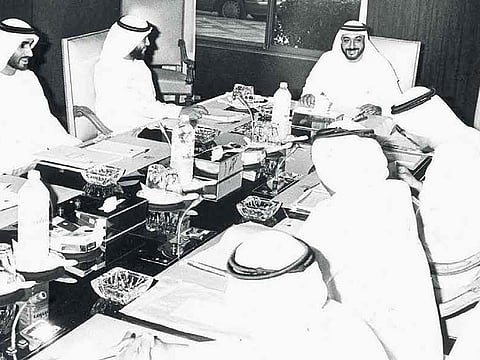UAE President Sheikh Khalifa: A vision for development and social welfare
Khalifa’s policies modernised governance, encouraged growth, raised living standards

From a young age, Sheikh Khalifa bin Zayed Al Nahyan proved he was an able partner in the leadership of Abu Dhabi by playing an important role in managing the affairs of the emirate and supporting his father Sheikh Zayed’s vision.
Sheikh Khalifa was instrumental in developing the machinery of administration and government, which transformed the emirate from its early tribal origins to become today’s modern capital city with effective institutions.
Sheikh Khalifa’s career of leadership began in 1966 when, aged just 18, he was appointed by Sheikh Zayed as his representative in the Eastern Region of Abu Dhabi and the head of the emirate’s courts – a sign of the confidence Sheikh Zayed had in his son at this early stage. That confidence was repeatedly demonstrated in subsequent years, as Sheikh Khalifa was appointed to a series of high-level positions, becoming Crown Prince of Abu Dhabi in 1969, a position he held till 2004.
As Crown Prince, Sheikh Khalifa held many senior posts in the administration of Abu Dhabi, of which the most important was chairman of the Abu Dhabi Executive Council, from where he managed the development of the emirate.
It was in February 1974 that Sheikh Khalifa became the first chairman of the Abu Dhabi Executive Council, which replaced the Cabinet of the emirate. As chairman, Sheikh Khalifa supervised the modernisation and development of projects throughout Abu Dhabi, transforming the emirate and building the base from which it has been able to become the modern city it is today.
Petroleum Council
In 1989, Sheikh Khalifa was also appointed chairman of Abu Dhabi’s Supreme Petroleum Council. In this role, he was responsible for steering the development of the all-important oil and gas sector and the downstream industries that have contributed so successfully to the UAE’s economic diversification.
Sheikh Khalifa also undertook the management and supervision of what was to be known as the Oil Partnership Negotiations, which reformulated the oil policy and established the foundations of a better and fair relationship with operating oil companies. In continuation of this role, Sheikh Khalifa assumed the presidency of the Supreme Council for Oil, a post which continues till now.
The Supreme Council for Oil is considered the highest reference in relation to oil companies operating in the emirate of Abu Dhabi and it is the supreme supervisor for the oil industry policy in the emirate in matters of regulation, exploration and production.
Investment authority
In 1976, Sheikh Khalifa assumed the chair of the Abu Dhabi Investment Authority, which supervises the management of financial investments in the emirate, operating within a strategic vision of developing Abu Dhabi’s financial resources.
Under Sheikh Khalifa’s guidance, the Investment Authority contributed to the training of a group of Emiratis, who assumed leadership roles in governmental agencies and authorities.
Of particular importance is Sheikh Khalifa’s setting up of the Abu Dhabi Department of Social Services and Commercial Buildings in 1981. Later called the Khalifa Committee, this department was charged with the provision of loans to citizens for construction.
Khalifa Committee
The intention of this department was to help citizens benefit from the country’s increasing wealth by offering massive loans without interest so they could build commercial buildings that would generate regular revenues. On one hand, these buildings would contribute to increasing citizens’ income while helping the UAE’s development on the other.
The department has disbursed over Dh35 billion in loans so far, to support the construction of over 6,000 residential towers and commercial complexes in Abu Dhabi, Al Ain and other places in the emirate.
Another decision taken by Sheikh Khalifa in 1979 was to fix the interest rate payable by citizens of loans for construction at 0.5 per cent, with the balance charged by banks paid by the Abu Dhabi Government.
A further step was Sheikh Khalifa’s decision to create the Private Loans Authority early in 1991 so Emiratis could build properties they needed, both for residential and for investment purposes. The authority disbursed loans totalling many tens of millions.
Modern vision
During his presidency of the Executive Council, Sheikh Khalifa paid great attention to the development of infrastructure, social welfare, a modern administration and an integrated legislation system as the basis of economic and social development.
Sheikh Khalifa made environmental issues a criteria for development projects and a principal part of the legislative system and public policies. This was bolstered by the appointment of a minister concerned with the environment in the first Cabinet formed during his term. Sheikh Khalifa’s closeness to his people is reflected in his concern for social support programmes that originated through personal encounters.
Till the end, Sheikh Khalifa remained sensitive to the people’s problems.



